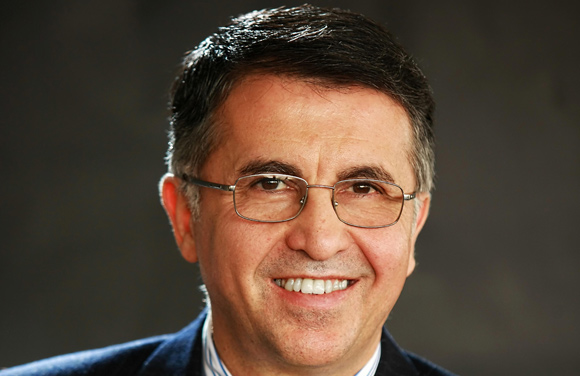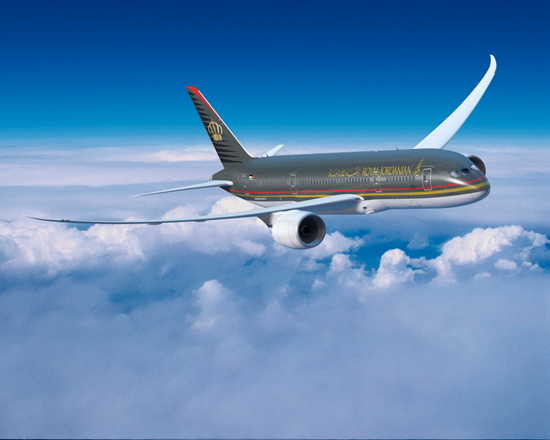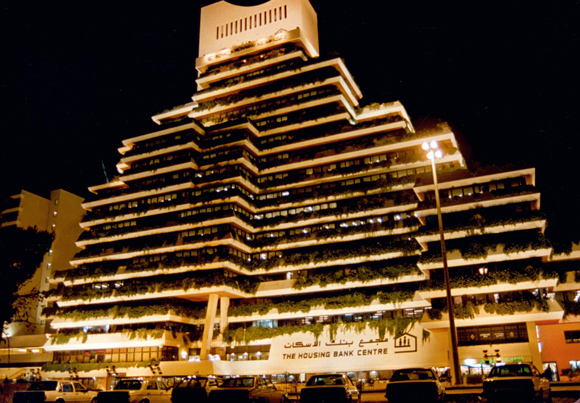Royal Jordanian Airlines
We are noticing that in Jordan, our market-share is in the upper 50s, sometimes close to 60% of the market, and this is unprecedented in many countries.
Interview with Hussein Dabbas, President and CEO of Royal Jordanian Airlines

Worldwide the aviation sector is facing a downturn. Do you see this affecting airlines in the Middle East?
Actually, the Middle East requires more time to mature to the levels we have seen in Europe and the US. We are still in the upward cycle of business. That’s why airlines in this region are still acquiring new airplanes and opening new routes, thus you would see there is a big growth in the number of passengers being carried in and out of the Middle East, particularly with airlines in the Gulf region where they are opening up new airports and creating a major hub for themselves in the region.
The airline business is an actual reflection of the economic growth of countries.
What is the industry outlook? It is in the growth stage now, but are we looking at consolidation in a few years?
The airline business is an actual reflection of the economic growth of countries. If the GDP is increasing, so would the traffic. Usually, travel is the first thing to be cut by corporations or individuals when the economic situation is not doing well. That’s why we have noticed during the past two years with the economy slowing down, that the traffic declined tremendously, be it cargo or passenger.
We suffered from that as well in the region even though we continued to expand the number of seats and frequencies because of previous orders of new equipment coming in. That slowed down slightly and created a big downturn in the average yield that airlines can charge, primarily because there were too many seats offered in the market to too few passengers. This affected airlines like Royal Jordanian where our average yield was decreased because of the heavy competition we are having from the airlines in the region and worldwide. Of course, we are seeing major consolidation amongst airlines in Europe and the US.
This is a very healthy sign I think for airlines because the competition is becoming very severe and unless airlines have a very strong base to work from it would be very difficult for them to survive on their own for a long time. That’s why we are happy to be a part of an alliance that helps Royal Jordanian expand its coverage to the world from the 700 plus destinations that the one world alliance allows us to sell and participate in selling
Royal Jordanian expand its coverage to the world from the 700 plus destinations that the one world alliance allows us to sell and participate in selling
For RJ, as many airlines in the region, consolidation is not out of the question, the merger is not out of the question, it depends when and how we see the right time for the airline to move into that direction. But as of now we stand on our own; we are a privately owned airline and are one of the few in the region whose stocks are rated in the stock market and we have to report to the board members who basically own the airline as private individuals.

How do you assess your financial performance and what emergency strategies have you come up with to cope with this slump?
We are a very conservative airline; we do not take uncalculated risks or expansions that are not properly studied or presented to the board for approval. Any expansion, be it in airplanes or destinations, have to make a lot of economic sense before we venture into such plans. During 2008 we suffered because of the fuel hedging as you know, with the prices jumping. We suffered tremendously during 2008 and the first half of 2009. There were a lot of financial numbers that had to be moved around between 2008 and 2009, to reflect the hedging etc.
Even though 2009 was a difficult year, we managed to increase our passengers by over 1% which was a really good accomplishment considering most airlines had a drop in the number of passengers. Yet, because of the drop in the yields our total revenues went down by around 15% in comparison to the year 2008. However, our costs also went down by 8 or 9% because of the prices of oil, thus we were able to generate a moderate profit of around 40 million dollars. We continuously strive to generate more revenues as well as control the cost of the airline.
The major cost we have is of course the fuel charges we have to pay. We have a lot of systems to make sure we are carrying the right amount of fuel on those destinations or picking up that fuel from the right destinations to make the operation as feasible as possible.
With rising costs and increased competition in the region, what areas of your business will feel the budget cuts?
We are not cutting budgets; we are a service industry and we have to provide the passengers with all the services they expect to receive when they buy a ticket on Royal Jordanian. Therefore, I am 100% against cutting any costs related to passenger comfort and convenience.
We are not cutting budgets; we are a service industry and we have to provide the passengers with all the services they expect to receive when they buy a ticket on Royal Jordanian.
On the contrary, we are spending more money on the amenities, on the food and drink, and entertainment systems. We are one of the few who offer movies on demand on the narrow body planes that we fly which is the 320 family.
We go out of our way to entertain the passenger, to keep them comfortable, to feed them well, and sometimes we overfeed them! We look at other ways of controlling costs, such as fuel, operation systems to use one engine while taxiing, the number of gallons of water we carry on board for the toilets, excess weight that affects fuel consumption.
At the same time we have a big freeze on new employment, so we have the same number of employees but we are increasing the number of passengers constantly which makes us a more efficient employer while providing the passengers with the top notch services they expect.

How about your expansion strategy? You mentioned it was more conservative…
By conservative I mean we don’t increase ten destinations a year, but our policy is to expand to at least two destinations a year, and we did that in 2009. In 2010 we added Madinah in Saudi Arabia and reopened our destination to Kuala Lumpur in Malaysia. So we continuously look at new destinations that we feel will add value and revenues to the airline.
For 2010 we are looking at Johannesburg, at Luxor in Egypt…but at the same time we have to see if we have the right fleet for these destinations. Currently we are stretched thin, our fleet is used heavily. We have around 30 airplanes right now; primarily they are brand new airplanes when we look at the narrow-body and regional jets. As for the long-haul airplanes like the 310’s, 330’s and the Airbus 340’s, these airplanes will be replaced starting in 2013 with the Boeing 787 which will be the core operation of our long-haul fleet which will fly to the US and North America as well as the Far East. We will start receiving the first Boeing 787 in September 2013 and we will continue receiving the rest of them through 2016.
The aviation sector in the Middle East is seeing growth with a growing number of airlines. How are you going to compete with all this development; what is your point of differentiation?
Competition is very healthy; sometimes it is difficult and forces us to reduce our revenue in order to be able to compete. However, I do not believe as a full-fledged service airline that I need to compete with the so-called low cost carriers. Basically, they offer a different product and are catering to a different customer base.
On the contrary, we are seeing that the pie is becoming larger than smaller in terms of number of passengers. For example, the Gulf has Al-Jazeera, and there are low-cost carriers operating from Kuwait, from Bahrain, from the UAE, yet our traffic to the Gulf has increased over 25% last year which is a clear indication that the market is growing. People now have more options; we fly three times a day to Dubai, for example; Emirates flies twice, other airlines fly twice. So we’re talking at least ten or eleven flights a day between Jordan and the Emirates alone. That indicates that there is traffic being generated.
Prices have gone down so people are traveling four or six times a year instead of once or twice which makes RJ more profitable as well. What our strategy is, basically I want to be a boutique airline; a small, nice airline that people will choose because they don’t want to stay at a hotel with 5000 rooms
Prices have gone down so people are traveling four or six times a year instead of once or twice which makes RJ more profitable as well. What our strategy is, basically I want to be a boutique airline; a small, nice airline that people will choose because they don’t want to stay at a hotel with 5000 rooms; they want to stay at a hotel with 22 rooms that provides personal attention and good service. This is what Royal Jordanian is doing right now. We’re a small airline, providing excellent service on and off the ground.
How does your background in marketing reflect on your communication strategy? How different is it?
Our mission is to be the airline of choice. When people go to a travel agency, I want people to say “book me on Royal Jordanian to London” or something, not to go and say “okay, what flights do you have?” We are noticing that in Jordan, our market-share is in the upper 50s, sometimes close to 60% of the market, and this is unprecedented in many countries. This is a clear indication that people like the product and services we are offering, and have high trust in the airline. This is a clear indication of the success of our strategy to be the airline of choice to the country.
What are some of the main challenges you face?
We live in an area that can be categorized by the West as turbulent. We have a lot of political and economic issues. A lot of things affect us in this part of the world; we have civil wars taking place around us, we are an island of stability in this region and we pride ourselves on this. It is very difficult running an airline because you have so many external factors affecting your livelihood. It is not the decisions we make internally but the decisions that are being made around us. We have been very agile and able to withstand and adapt to the difficult situations that we go through. It is something that we have gotten accustomed to doing in the past 46 years of operation.
Royal Jordanian is an ambassador of Jordan. What would be your message about Jordan to our audience?
Jordan is a very well-kept secret from many people. We don’t mind it being that way because we want tourism to come to Jordan for specialized reasons; we are not a mass-tourist destination. When people come to Jordan, they make it a point to come back again year after year or every few years to indulge themselves in the facilities and scenery that is available to them.
You can drive from the North to the South within five hours; you can be based in Amman and visit three or four sites just by driving 100km and back. People really enjoy the welcoming nature of the Jordanians.
You can drive from the North to the South within five hours; you can be based in Amman and visit three or four sites just by driving 100km and back. People really enjoy the welcoming nature of the Jordanians. Jordanians love foreigners, they take care of them, sometimes they are nicer to foreigners than they are to each other! In general, it is a very hospitable and welcoming country and we are proud to be the national airline of Jordan and to carry the flag and the crown on our aircraft.
It is part of our mission to promote tourism to Jordan and to be ambassadors to promote good-will as His Majesty King Hussain said. Of course, the support we are getting from His Majesty King Abdullah and the government is tremendous; we don’t get financial support but we do get a lot of actual support. This support would not have come had we not proven that we are a worthy airline of this country and that we are presenting the people and the country in the best way possible.